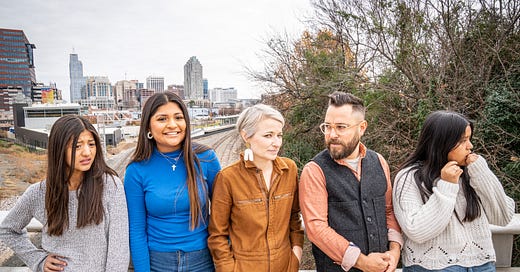It began a few weeks ago. All six of us—me, Rush, our three teens, the dog—were wedged in the car, on our way to a funeral some three hours away, when I suggested we listen to a “murder podcast.” Honestly, I don’t know what I was thinking. That I couldn’t bear another Morgan Wallen album? That something educational, intellectual, would be nice for a change? Or maybe it was more simple than that. Maybe I was just desperate for truth to be named, however deranged the form.
The funeral wasn’t a surprise; Rush’s ninety-eight year-old grandmother died peacefully in a nursing home. But grief has always been a companion to our family from the day the girls became ours through loss rather than birth. That loss got more acute recently. So, too, has the grief of adolescence. (I can’t stop clicking on articles like this one about the special misery of teen girls.) Which means our girls sometimes struggle to tell, if not know, the particular truth of their lives. A lot of their grief is showing up as silent tears, splitting heart burn, invulnerable bro’s and nuh-uh’s.
Back on the road, we listened to a true crime podcast for thirty minutes before a barrel of body parts was found. “Rushy, no!” our fifteen year-old squealed with nervous laughter from the back seat. Frantic, I lunged for the pause button on my phone. The podcast was a valve, sure, but not the valve I’d hoped for. We joked about barrels the rest of the weekend. I finished the podcast on my own when we returned home from the trip, during long solitary walks with the dog, long solitary nights of insomnia. And then when I finished one season, I listened to another and another and then another.
I know. I didn’t expect it either. But I think true crime podcasts are helping me become a better parent. They’re helping me see how healing shared facts can be for a family when observed with the compassionate coolness of a reporter. (I want the voice of Sarah Koenig in my head.) How when people who are very often my teens avoid the unvarnished truth, 97% of the time this isn’t malice but armor. Mostly, I think true crime podcasts are helping me relinquish the need to know the full story of who my children are and will become. I don’t have to know the full story to love the story.
So I am loving the second season of Bear Brook. The Coldest Case in Laramie was okay (too many interviews, not enough analysis, IMO). I thought maybe it was podcasts in general that were proving therapeutic and so tried an On Being episode about the science of awe but, strangely, that only made me feel more wound up. I didn’t need to be reminded of the miracle of life. I needed to be in the company of people who knew its surlier side and were not afraid to beg reality, however unsettling or incomplete. No true crime story ends with all the facts laid bare—in parenting too.
I remember when folks used to say to me, “I could never do what you did. I could never foster knowing I might have to let go.” I always wanted to say back, “But isn’t that all of parenting? Isn’t all of parenting ultimately aimed toward the relinquishment of love? the lesson of loosened grip? the power of being powerless and listening anyway? Not because any answers will come of it, though those are nice. But because there’s something in the powerlessness that makes you more human, less superwoman, a gentle witness to the unsolvable truths of your own life.
I went down a Serial podcast rabbit hole recently and ended up listening to The Trojan Horse Affair (a non-murdery option, if you’re into that.) And in it, Hamza, one of the reporters, gets so upset that the season concludes without many answers, without much impact. But damn if I didn’t enjoy the slow burn of that story more than I ever cared about figuring out the whodunnit. It was a story that was less about facts and more about the unfolding of an unlikely friendship.
Good God, what I wouldn’t give to talk baldly to my children about the facts of their life. (Just tell me the last name of one of your friends, okay? Just tell me you didn’t turn the assignment in, okay? Just tell me you want to smush my face in, okay? Okay? It’s okay.) Even more though, I have to keep reminding myself, I want their friendship. And, maybe someday, to be able to listen for the truth together, barrels and all.
XO,
Erin
P.S. Do you or the kids in your life call God she? Is this she God always a mother God? If not a mother, then what? (Auntie God? Sister God? Grown Ass Woman God?) More in this Instagram Live interview with me and one half of the Reverend Mamas duo, Cameron Vickrey.
P.P.S. And the Oscar goes to mommies!?! Yes, Daniel Scheinert, director of Everything Everywhere All At Once, wants to thank all the mommies. (He also thanks teachers!) But my favorite moment of the night was watching non-mom Lady Gaga sing bare-faced. Also not to be missed? Best Adapted Screenplay winner, Women Talking. Stunning.
P.P.P.S. I started drinking more when I became a parent. Which seemed like the opposite of what you were supposed to do. Like mother love was supposed to be a life raft. No one told me you could end up under the raft, too. A gorgeous new book from Laura McKowen, Push Off From Here, is helping me stay afloat.





Oh, I love this so much! Anything that produces empathy is a win in my book.
Powerlessness as a way to be more fully human (or at least a reminder that you are!)- always appreciate your out-of-the-box thinking, Erin!